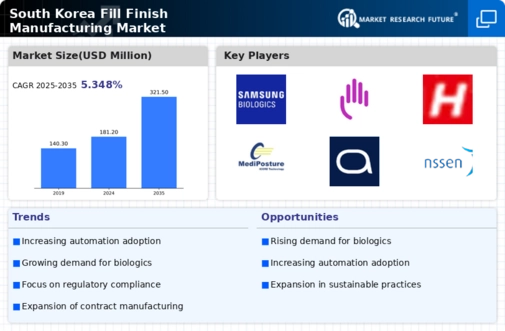Rising Demand for Biologics
The fill finish-manufacturing market is experiencing a notable increase in demand for biologics, driven by the growing prevalence of chronic diseases and the need for innovative therapies. In South Korea, the biologics sector is projected to reach a market value of approximately $3 billion by 2026, reflecting a compound annual growth rate (CAGR) of around 10%. This surge necessitates advanced fill finish-manufacturing processes to ensure the safe and effective delivery of these complex products. As a result, manufacturers are investing in state-of-the-art technologies and facilities to meet the stringent requirements associated with biologics, thereby enhancing the overall capacity and efficiency of the fill finish-manufacturing market.
Increased Focus on Quality Assurance
Quality assurance remains a critical driver in the fill finish-manufacturing market, particularly in South Korea, where regulatory standards are stringent. The emphasis on product safety and efficacy has led to the implementation of robust quality control measures throughout the manufacturing process. Companies are increasingly adopting advanced analytical techniques and automated systems to ensure compliance with Good Manufacturing Practices (GMP). This focus on quality not only mitigates risks associated with product recalls but also enhances consumer trust. As a result, the fill finish-manufacturing market is likely to see a rise in investments aimed at improving quality assurance protocols, which could lead to a more reliable supply chain.
Technological Integration and Automation
The integration of advanced technologies and automation in the fill finish manufacturing market is transforming production capabilities. This transformation is enhancing efficiency and reducing human error. In South Korea, manufacturers are increasingly adopting robotics and artificial intelligence to streamline operations and reduce human error. This technological shift is expected to enhance productivity by up to 30%, allowing for faster turnaround times and improved scalability. Moreover, the implementation of smart manufacturing solutions enables real-time monitoring and data analytics, facilitating better decision-making processes. As a result, the fill finish-manufacturing market is poised for significant advancements, potentially leading to cost reductions and enhanced product quality.
Growing Investment in Research and Development
Investment in research and development (R&D) is a pivotal driver for the fill finish-manufacturing market, particularly in South Korea, where innovation is highly valued. Pharmaceutical companies are allocating substantial resources to R&D to develop new formulations and delivery methods. This focus on innovation is expected to result in the introduction of novel products, thereby expanding the market landscape. In 2025, R&D spending in the pharmaceutical sector is anticipated to reach approximately $1.5 billion, underscoring the commitment to advancing fill finish-manufacturing capabilities. Such investments are likely to enhance the competitiveness of the fill finish-manufacturing market, fostering growth and sustainability.
Expansion of Contract Manufacturing Organizations (CMOs)
The rise of Contract Manufacturing Organizations (CMOs) is significantly influencing the fill finish-manufacturing market in South Korea. As pharmaceutical companies seek to optimize their operations and reduce costs, they are increasingly outsourcing their fill finish processes to specialized CMOs. This trend is expected to grow, with the CMO market projected to expand at a CAGR of 8% over the next five years. By leveraging the expertise and capabilities of CMOs, pharmaceutical firms can enhance their production efficiency and focus on core competencies. Consequently, the fill finish-manufacturing market is likely to witness a shift towards collaborative partnerships, fostering innovation and flexibility in production.
















